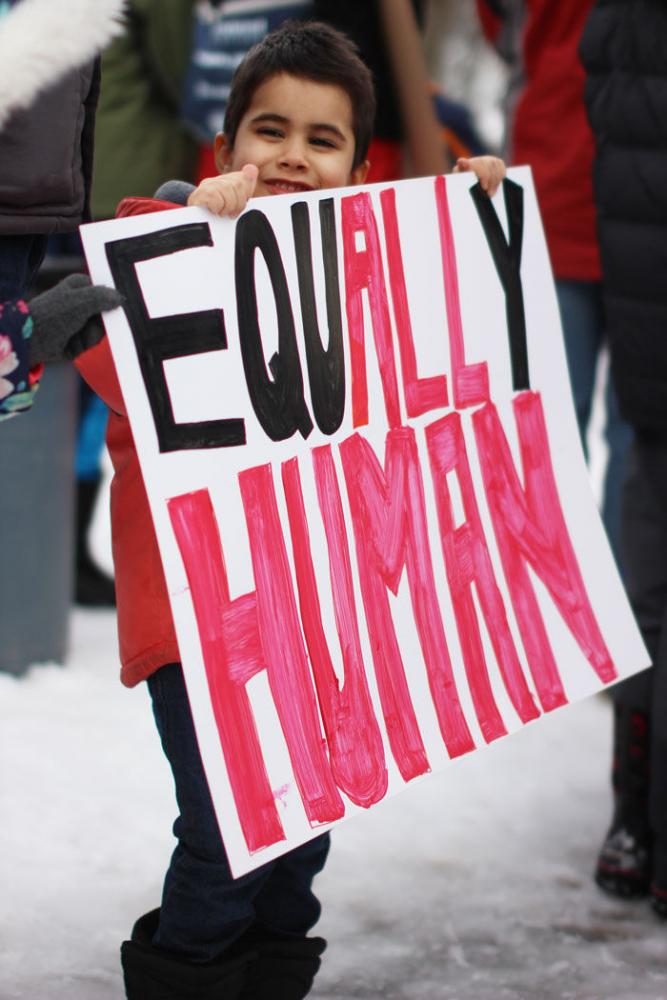‘Huddled masses’
February 6, 2017
Moscow community members could hear the voices of the Palouse Proactive protesters for several blocks as they approached East City Park.
“We don’t want a ban, we don’t want a wall, we want liberty and justice for all,” the crowd chanted.
Palouse Proactive hosted the “Beyond the Ban: Stand with Immigrants” rally on Saturday, uniting community members from the greater Moscow-Pullman area.
“We will not stand quiet, we will not let them take our rights away,” said Shirin Shahsavand, an Iranian immigrant working at WSU.
Throughout the rally, volunteers came forward for those who were hesitant to voice their hardships due to the fear of arrest. They read off “impact statements,” beginning with, “I speak for him/her” and ending with, “I stand with him/her.”
“This rally is about turning anger and fear into love,” said Mary Hawkins, a member of Palouse Proactive who emceed the rally.
Many of the speakers referenced a famous quote on the plaque of the Statue of Liberty: “Give me your tired, your poor, your huddled masses yearning to breathe free.” Many protesters also held signs referencing this poem.
The Rev. Elizabeth Stevens of the Unitarian Universalist Church of the Palouse said this is an epic battle between the highest ideals on one side and fear and greed on the other side.
“We rise for justice, we rise for human rights, we rise for all,” Stevens said.
She said the Islamophobia she has seen around the world troubles her. Citing the recent Canadian mosque shooting, Stevens said the terrorist attacks that should be prevented are the acts being perpetrated against Muslims.
“This is not who we are as Americans,” Stevens said. “It is evil to turn our backs, and we are not evil.”
Imam Raed Alsawaier of the Moscow Islamic Center also spoke during the rally, telling attendees not to harden their hearts against others.
“I am heartened by this amazing presence and support that we get from the community, a majority of which is not Muslim,” Alswaier said.
Alswaier ended his speech with a quote from an 8th-century Muslim leader, who was answering the leader of a city who asked if he had permission to build a wall to protect the northern border.
“The Muslim leaders sent him a letter back and he said, ‘Protect your city with justice, clear the streets of your city from oppression and then you’ll achieve peace,’ ” he said.
Despite current events, he said he still believes the U.S. is a positive place.
“The true harm is against all the beautiful values that this country represents,” he said. “These beautiful values are what many nations aspire to achieve and many refugees in war-torn countries admire.”
Protesting and resisting is becoming the “new normal” under the Trump administration, Moscow Human Rights Commission Chair Ken Faunce said.
“It’s time to stand up and say enough,” Faunce said. “Only together can we bring light to the darkness.”
WSU employee Shahsavand said she was grateful to all present at the rally.
“Despite all the sadness and anger that the executive order created, this last week has restored my faith in humanity,” she said.
Shahsavand told attendees to look around them and see that they were surrounded by love. She said she wanted everyone to feel that “kindness and compassion still exist in this world.”
“We will not stand quiet,” Shahsavand said. “We will not let them take our rights away and we will emerge stronger than ever, just as we already have.”
The rally ended with attendees and spokespersons joining together in song. They sang “We Shall Overcome” to show their unity against Trump’s executive ban.
A counter protest also took place during the event, as about 10 members of the WSU College Republicans stood by one of the park’s exits.
College Republicans President James Allsup held a sign that read “Ask me about Cologne.” He said this was in reference to the mass sexual assault of more than 1,000 women during the 2015/2016 New Year’s Eve in Cologne, Germany. Many of the assaulters were refugees from the Middle East who had been taken in by Germany’s government, Allsup said.
According to a Der Spiegel article, in the incident Allsup talks about, there were 68 asylum seekers out of the total 153 suspects. One of the suspects was a U.S. citizen.
Allsup said the list of banned countries decided by the executive order needs to be “fine-tuned.”
“It’s a work in progress,” he said.
Allsup said he disagrees with Iran being put on the list but believes Pakistan should have been. He said the plan is to add more countries in the future.
“You don’t lock the door because you hate what’s on the outside,” Allsup said, “but because you love what’s on the inside.”
None of the other counter protesters wished to comment.
Editor’s Note: This article has been updated.





















